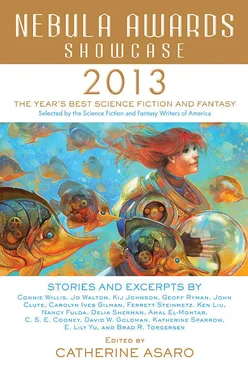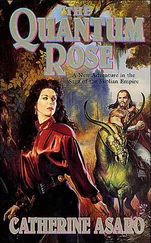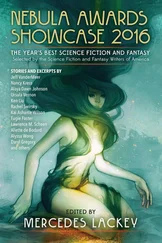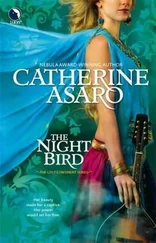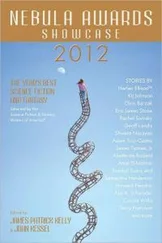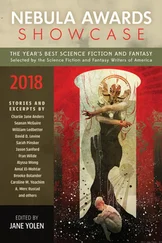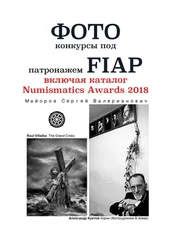By the time the bell rang at noon, Sophie was the proud possessor of two high-necked calico dresses, two petticoats, white calico stockings that tied at her knees with string, a crisp white apron, and a pair of scuffed brown boots with buttons up the side that were too big and had to be stuffed with rags to keep her feet from sliding.
Aunt Winney smiled. “You pretty as a picture, sugar.”
Pretty? Sophie turned and stared in the mirror.
A stranger stared back at her with dark, surprised eyes. With her hair hidden by the white tignon and a shape created by layers of petticoat and a fitted top, she looked almost grown-up. But pretty? Mama certainly wouldn’t have thought so.
Aunt Winney’s dark, round face appeared over her shoulder. “Now don’t you go running away with the notion that yaller skin make you better than other folks. You hear what I say?”
Why did people kept telling her to be humble? The girl in the mirror looked meek enough to Sophie. “Yes, ma’am.”
“Good. Now, run on down to the kitchen and fetch me a bowl of mush. You can catch a bite while you down there, but no lollygagging.”
The shortcut to Oak Cottage passed behind the maze. Sophie was tempted to run in to look for the Creature, remembered it was off-limits, decided she’d let it go. Being a slave wasn’t as bad as she had feared, now she’d been assigned to the Big House. She liked her many-times-great grandmother, and it seemed like her grandmother liked her, too. Maybe they’d get to be friends, and Sophie could tell her about the present. That would make a good adventure.
When she reached the kitchen, Sophie asked a slave woman shelling lima beans on the bench outside for two bowls of mush. The woman glared at her. “Bowls is in the blue dresser and mush in the iron pot. Wait on your own self.”
Sophie took two steps into what felt like a steam bath perfumed with pepper and onion and browning butter and her stomach turned over. She’d been feeling off all morning—nerves, she’d thought. Maybe it was just hunger. Careful to keep out of everybody’s way, she found the blue dresser and the bowls. The iron pot hung at the side of hearth. Sophie looked in and saw yellow mush mixed with unidentifiable lumps that might be potatoes or yams or chunks of fatty meat. There were flies struggling on it—and probably in it, too.
Heat washed over Sophie like scalding water, her stomach clenched, and she threw up on the stone hearth.
First she thought she’d die of shame and then she just thought she’d die. Everything inside her seemed to be trying to get out and her head beat like a thousand drums. Shrill voices pierced her ears, pinching hands pulled at her as she was heaved up like a bundle of laundry and carried out into the air.
After that, Sophie was conscious of very little except how miserable she was. At some point, her fouled clothes were taken off. She felt water cooling her burning skin, then a coarse gown that rasped her like sand paper. Large, cool hands touched her rigid belly and her forehead. She heard a voice she knew was Dr. Charles’s saying that Robert should never have sent a city girl to the swamp in fever season.
She dragged her eyes open, saw her arm stretched over a white basin. Dr. Charles was beside her, holding a knife as bright and painful to look at as a bolt of lightning.
The knife bit into the crook of her elbow, and she felt very weak and sleepy and Papa was squeezing her arm and telling her that he’d come to take her home.
“I miss my Punkin-Pie,” he said, and opened his mouth wider and wider, swallowing her arm clear up to the elbow. Sophie was wondering, without real interest, whether he intended to eat her clear up when she noticed the Creature floating in the air beside her, its face all puckered like a baby about to cry. She opened her mouth to give it a piece of her mind, then got distracted by Papa turning into an old man with a tall hat like Abraham Lincoln’s. But he couldn’t be Abraham Lincoln because Lincoln was white and this old man was black as his hat, black as the crooked stick he carried, wound with red thread and white shells.
He waved the stick towards a door outlined with a thread of blinding light. As Sophie watched, the thread widened to a scarf, then a ribbon. The door was opening.
“Fetch Africa,” a woman’s voice said. “This girl going fast.”
What girl? Sophie wondered. And where was she going?
“Papa Legba.” She saw the Creature crouched at the old man’s feet. “Can you save this-here white girl? I go to a lot of bother to get her, and there ain’t another one will do as well.”
The old man gave the Creature a look that could have skinned a mule. “Serve you right, duppy, if she do die. You can’t just go dragging folks through time like it was a railway station!”
One amber eye peered up impudently. “Don’t serve her right, though. Dead, she ain’t worth nothing. Live, she might could do some good.”
The old man studied the Creature, his face still as a carving. Suddenly he laughed. “That plan of yours, duppy, is like something Compair Lapin and Bouki might hatch when they been drinking corn likker. Going to be fun to watch. But you best remember all doorways belong to me. I choose when they open, where they lead, and who may pass through.”
The Creature touched the old man’s boot. “I remember.”
Sophie was about to ask the old man if he could open a door and send her home when a dark blue void opened over her bed. She saw a light sparkling in the heart of it, crystal blue. The scent of salt water tickled her nose; the taste of molasses filled her mouth. The bed rocked under her, floating on a gently swelling sea. A wave leapt up, caressed her body coolly, withdrew. The void filled with a velvety voice singing a wordless song, and a queenly figure appeared, crowned with gold and veiled with strings of pearls.
“Yemaya,” said the old man in the hat.
“Don’t you know better than to lead a child through into this time with no preparation? The water and the food are poison to one who is not used to them. You play a dangerous game, Legba.” The musical voice was stern.
“I am dangerous,” said the old man silkily.
“And I am not?”
For a moment, the air around the two entities crackled and buzzed. Then the old man laughed. “You’re barking up the wrong tree, Yemaya. This game belongs to the little trickster, who plots but never plans.”
The Creature grinned sheepishly.
“You play with forces you do not understand,” the woman told it, angry and amused. “Do not do so again.”
“No, ma’am,” the Creature said. “Not ’less I needs to. Can you fix her?”
“I can,” the velvety voice said. “I will.”
The door snicked shut, darkness fell, and Sophie was asleep.
* * *
After a dreamless, drifting time, Sophie woke to an unfamiliar room, the crimson glow of a fire, and a woman bent over a big-bellied pot like a witch in a fairy tale. She felt like she’d done three thousand sit-ups and run fifty miles in a desert, but she wasn’t sick any more.
The woman turned. Without her glasses, Sophie couldn’t see her face, but she was dressed in blue with yellow around her head, like Yemaya, and held herself like a queen.
“Bout time you woke up,” the woman said. “I ain’t got no root for sleeping-sickness.”
It was a beautiful voice, but it was human, and Sophie recognized it. “You’re Canada’s mother. Africa.”
“That’s right, and I’m right glad you know it. You been clear off your head since Dr. Charles bled you yesterday.” Africa put aside a curtain of gauzy fabric, slid an arm under Sophie’s shoulders, and held a steaming cup to her lips.
The mixture was bitter and mossy and thick with bits of leaves. As Sophie choked it down, Africa said, “I don’t know what to make of you, and that’s the truth. The Master of the Crossroads, he goes his own way. That way sometimes bright and sometimes dark, but it ain’t never what I’d call easy.”
Читать дальше
